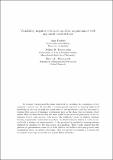Variability, negative evidence, and the acquisition of verb argument constructions
Author(s)
Perfors, Amy; Tenenbaum, Joshua B.; Wonnacott, Elizabeth
DownloadTenenbaum_Variability, negative.pdf (777.2Kb)
OPEN_ACCESS_POLICY
Open Access Policy
Creative Commons Attribution-Noncommercial-Share Alike
Terms of use
Metadata
Show full item recordAbstract
We present a hierarchical Bayesian framework for modeling the acquisition of verb
argument constructions. It embodies a domain-general approach to learning higher-level
knowledge in the form of inductive constraints (or overhypotheses), and has been used to
explain other aspects of language development such as the shape bias in learning object
names. Here we demonstrate that the same model captures several phenomena in the acquisition
of verb constructions. Our model, like adults in a series of artificial language
learning experiments, makes inferences about the distributional statistics of verbs on several
levels of abstraction simultaneously. It also produces the qualitative learning patterns
displayed by children over the time course of acquisition. These results suggest that the
patterns of generalization observed in both children and adults could emerge from basic
assumptions about the nature of learning. They also provide an example of a broad class
of computational approaches that can resolve Baker’s Paradox.
Date issued
2010-04Department
Massachusetts Institute of Technology. Department of Brain and Cognitive SciencesJournal
Journal of Child Language
Publisher
Cambridge University Press
Citation
Perfors, Amy, Joshua B. Tenenbaum, and Elizabeth Wonnacott. "Variability, negative evidence, and the acquisition of verb argument constructions." Journal of Child Language (2010), 37: 607-642
Version: Author's final manuscript
ISSN
0305-0009
1469-7602